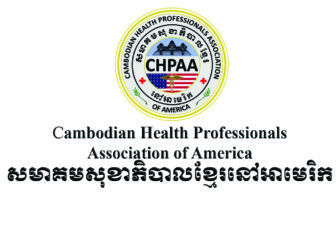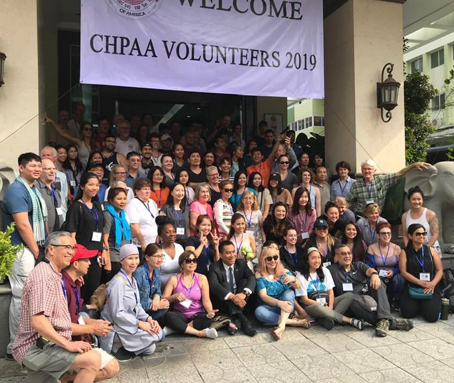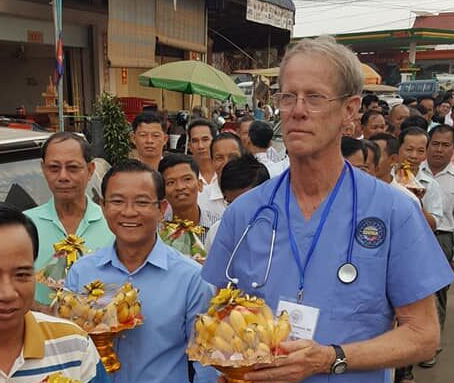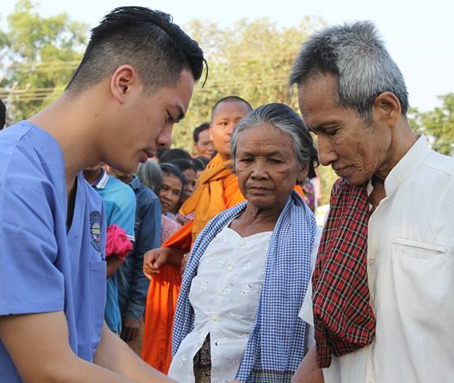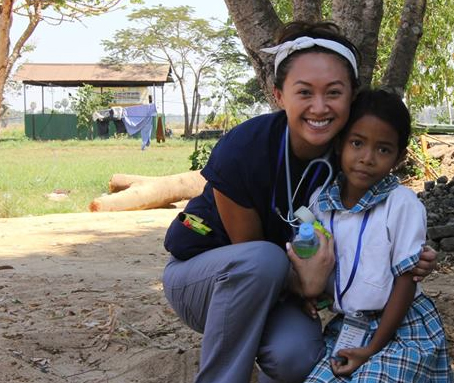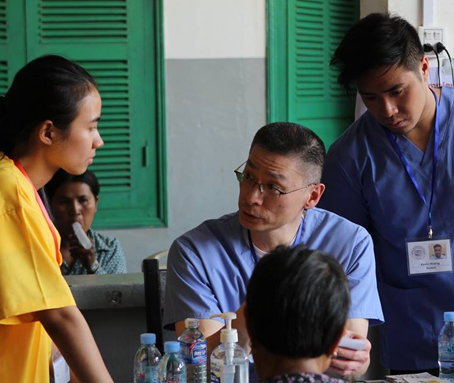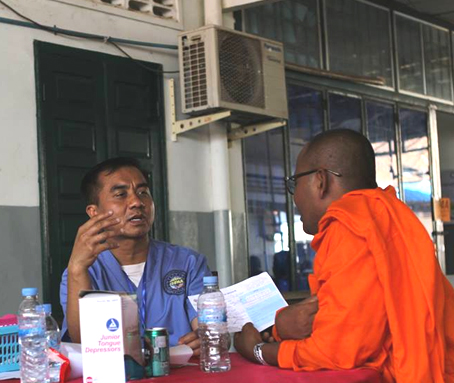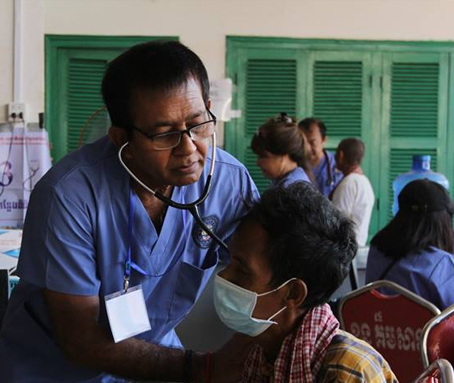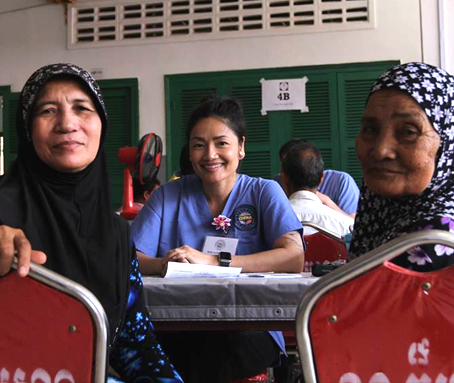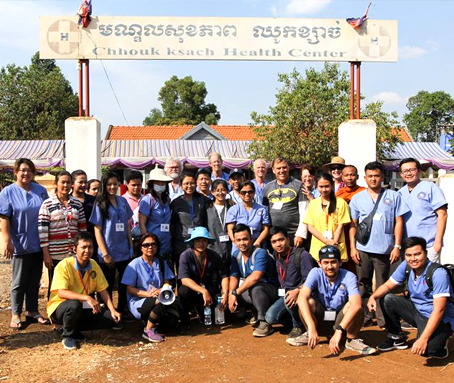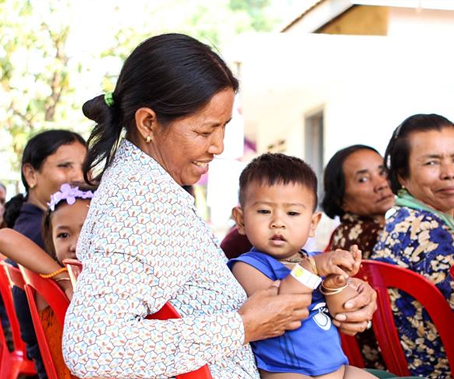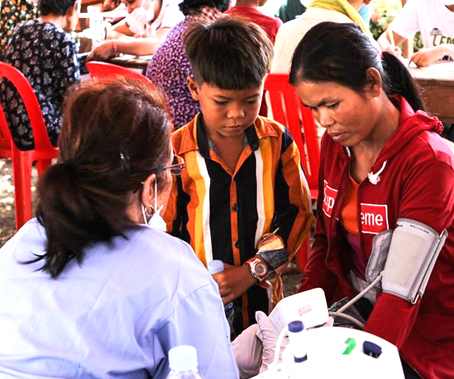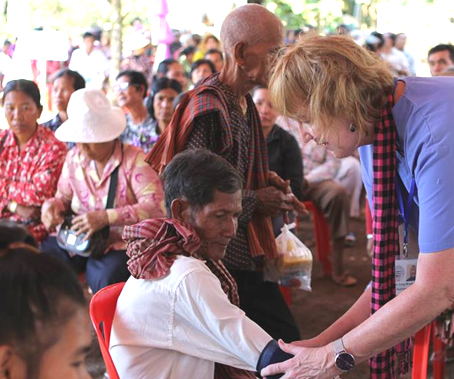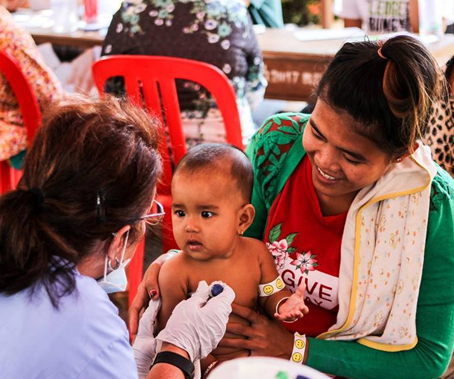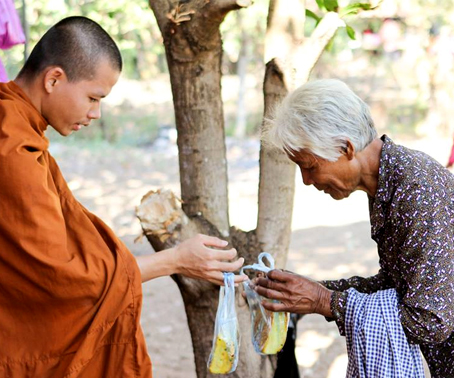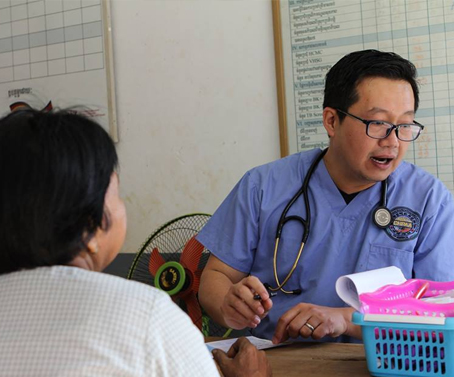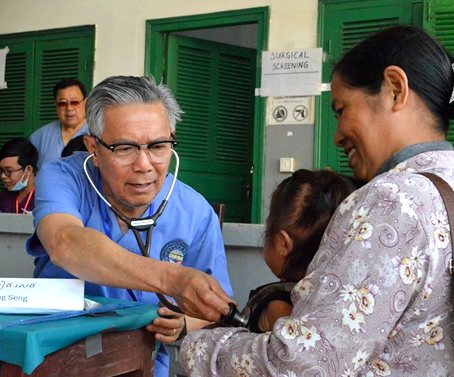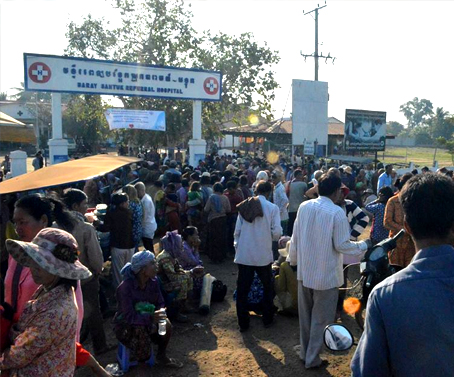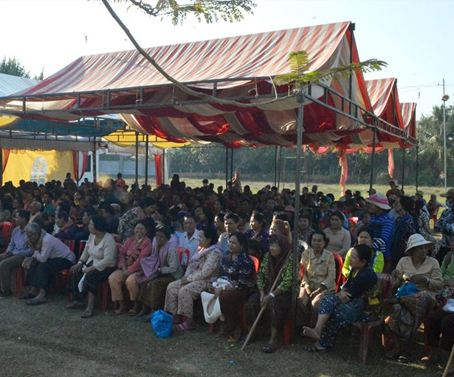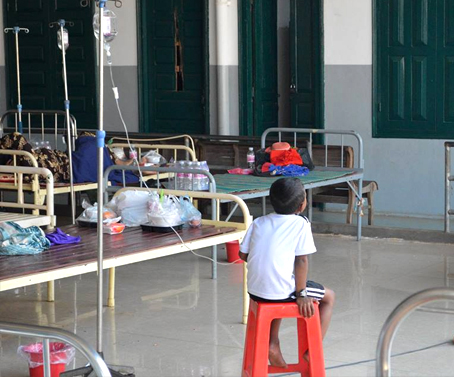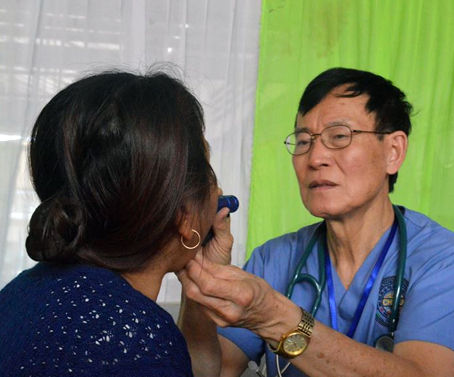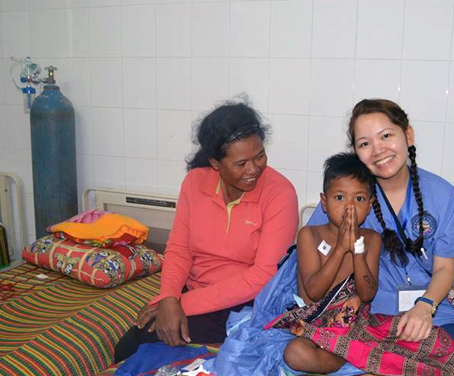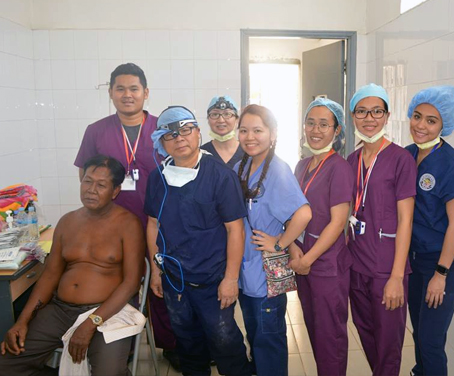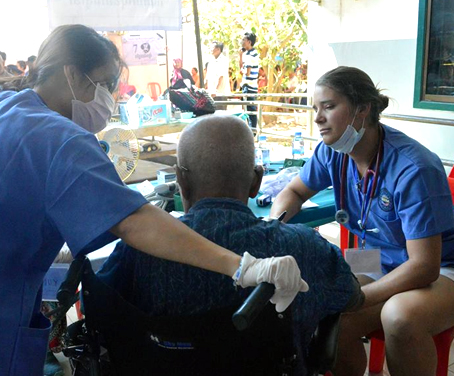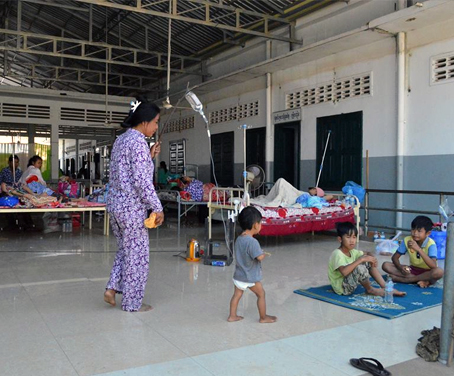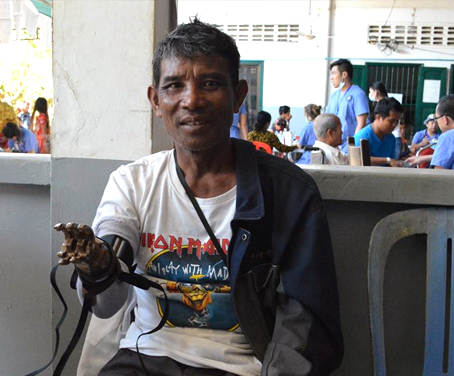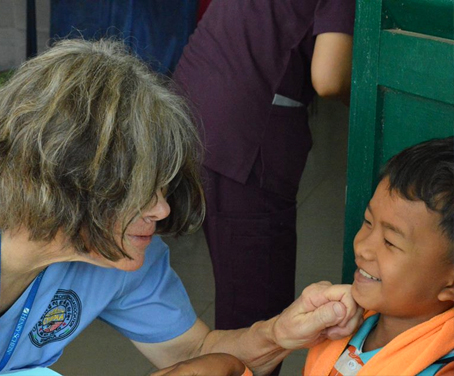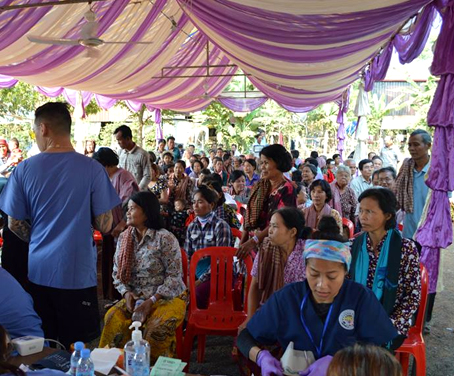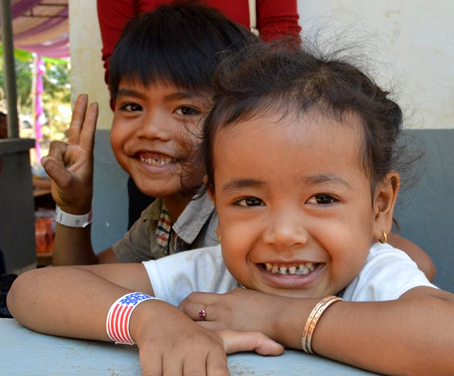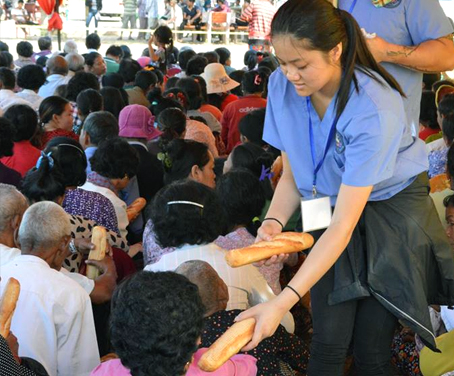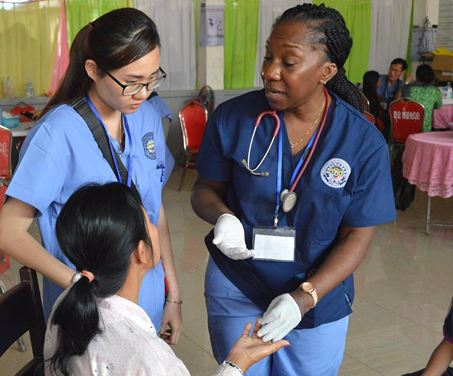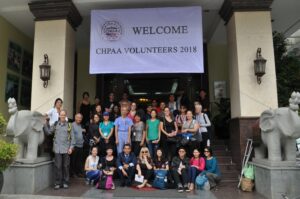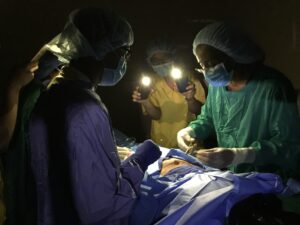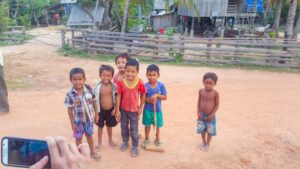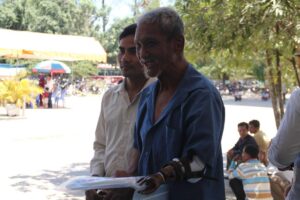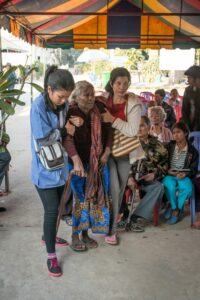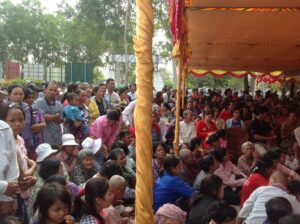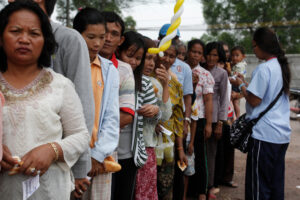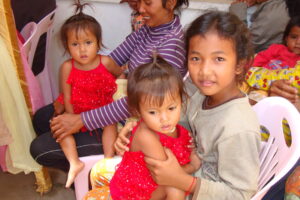Mission 13: Kratié 2025
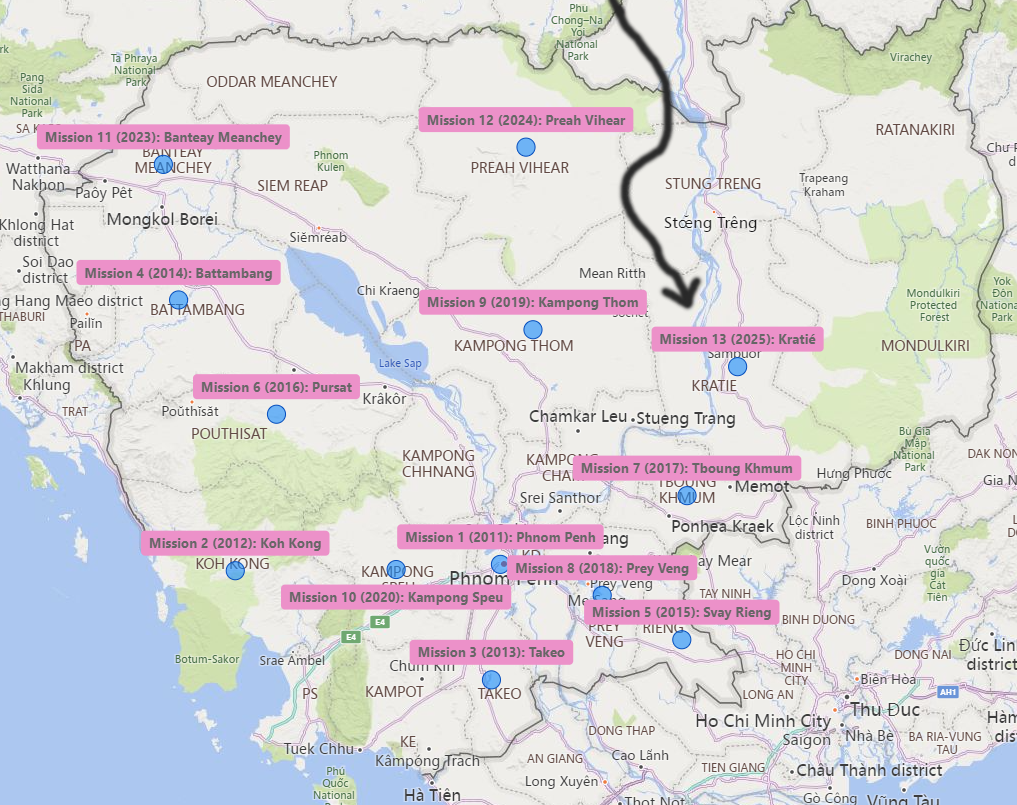
CHPAA is planning its 13th Medical, Surgical and Dental Mission to Cambodia, to the province of Kratié, from February 5, 2025 – February 20, 2025. CHPAA is thankful for your participation in this life-changing experience. Your time and talents will make a difference in your life and the lives of the underprivileged people of Cambodia. Please contact us for any inquiry or questions. All volunteers, either health professionals or non-health professionals are welcome to apply.
Itinerary
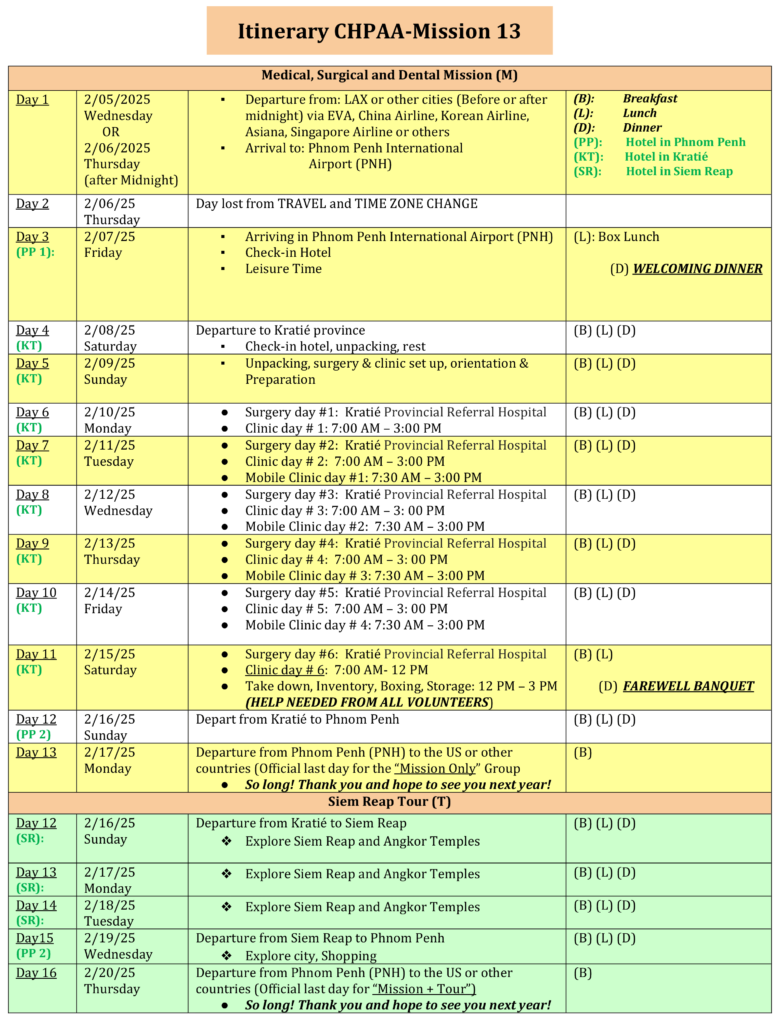
Volunteer Application
Deadline December 31, 2024
CHPAA is accepting applications to our upcoming mission to Cambodia from February 5, 2025 to February 20, 2025.Apply Now Expired
Deadline September 30, 2024
For student volunteers in Cambodia — given high volume of applicants, consideration only given to year 5/6/7 in dental and medical programs, year 4/5 in pharmacy program.Apply Here Expired
Flight Itinerary
CHPAA provides transportation to and from Phnom Penh airport. In order to assure your airport pick-up and drop-off, please forward your itinerary ASAP or one week prior to your arrival and departure.Mission 13 Flight Itinerary
Visa requirements for all travelers to Cambodia
CHPAA has a good working relationship with the Immigration Authority in Cambodia. Therefore, it would be easier to apply for Visa upon arrival at Phnom Penh, Cambodia.
- You will need two passport photos (2”x2”).
- Visa fee is $30 in cash (please make sure you have exact change)
- This Visa fee can be waived, if you are Cambodian born (check ‘Place of birth’ on your passport) or
- If you are a Cambodian descendant (please bring a copy of your birth certificate to prove that one of your parents was born in Cambodia).
For more information, please visit:
https://travel.state.gov/content/travel/en/international-travel/International-Travel-Country-Information-Pages/Cambodia.html
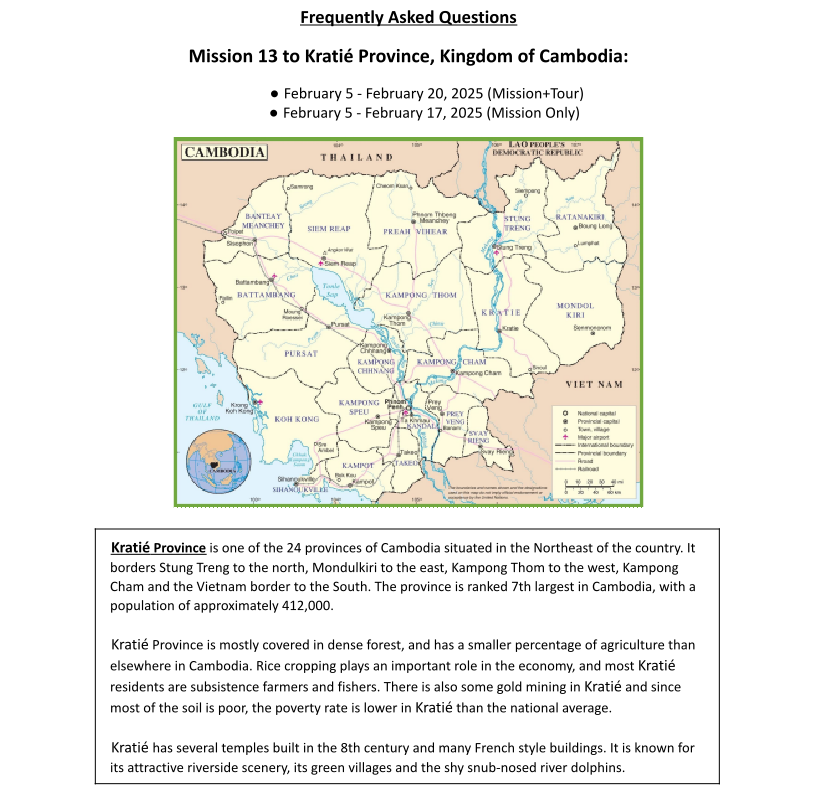
- How do we obtain a VISA to enter Cambodia?
- For Non-Cambodians, you must get a T Visa, costing $30 at https://www.evisa.gov.kh/
Please go online to explore the steps and reach out if you have further questions. - For Cambodian-Americans, you must get your K Visa on Arrival at airport, Free of Charge
For Cambodian Americans (proof of being born in Cambodia on the passport), or offspring of Cambodian Americans (proof of both parents or either mother or father born in Cambodia with a copy of birth certificates, the visa is free of charge with multiple entries, and there is no requirement for a photo (I would recommend having 2 (2X2) photos anyway.)
- For Non-Cambodians, you must get a T Visa, costing $30 at https://www.evisa.gov.kh/
- How much luggage can I check on the flight?
Usually each passenger is allowed two 50 lbs. check-in luggage. Volunteers who are traveling through LAX are requested to help carry CHPAA supplies/medicines in the 2nd check in luggage. This will be your second checked luggage. If you are traveling with a companion, we would appreciate it if as a couple, you can carry 3 boxes instead of 2 –as required. Thank you for your assistance. We will continue discussions on luggage at a later date, and we have protocols for the labels on the luggage. - Do I expect to pay extra in and out of the airport, e.g. departure fees?
No fees are required upon departure. Extra fees are already built into the price of the air ticket. - Will volunteers be picked up at the airport?
The short answer is “yes”, within the date parameters of the official itinerary. It is understood that some flights come in the day before and there are some exceptions to the rule. The sooner we have your flights, the easier it will be to plan. So, please make sure to send your full flight itinerary, so we can put you on the list for pickup and drop off. In the unlikely event that you arrive unannounced, please show the immigration officer the CHPAA logo and letter to be provided to you, and self-identify yourself as a CHPAA volunteer. If you will be arriving days before or leaving days after the official itinerary, you can contact: Sovatey Ing , +85512825333, Email: vatey@vlktravel.com or make your own transport reservation to and from the airport. This will be your responsibility. - Am I responsible for costs, including accommodation, before and after the official mission Itinerary?
CHPAA covers costs such as your accommodation, meals, and transport, as per the official itinerary. Beyond those dates, please contact: Sovatey Ing, +85512825333, Email: vatey@vlktravel.com, who will assist you with your specific needs before and after the mission. - Where do we get clean and safe water during the trip?
Water will be provided throughout the entire trip. Some water will be available in the rooms, and bottled water and sodas are also available for sale by street vendors and at markets. Water must not be wasted. From previous experience, we noticed multiple unfinished water bottles that were wasted. Realizing how precious clean water is to us, please mark your bottles immediately, or you may want to bring your own flask to top up from our clean water source. - What is the attire for the welcoming and farewell dinner receptions?
Neat casual is just fine! No cut out jeans, flip flops, ultra short dresses & skirts, and wear your name tag. Group photos are usually a highlight! You may wear western-style clothes or go “ethnic” – any ethnicity is welcome! - What is the dress code for our visits throughout Cambodia?
Generally speaking, ultra “short-shorts” & skirts, ultra low cut tops, cut out jeans, are not encouraged during our visits throughout our trips, except when you’re doing things during your free time. On our trip, we are representing our organizations (CHPAA) & our professionalism, and we would like to leave with a lasting and positive impression when people meet, greet & talk to us. Use your common sense during your free time; however, these are the expectations during our trip:- Historical Monuments & cultural tours (such as Temples, particularly the Angkor Wat site)
- Neat tourist attire, no ultra short shorts, bare shoulders)
- Strong recommendation to wear closed toed shoes in some areas, such as, the temples.
- Strong recommendation to bring your flip-flops at all times.
- At temples, many places of worship do not allow exposed shoulders, short- shorts, and other revealing attire. Our suggestion is to bring an extra t-shirt, a long scarf, etc.
- Hospital/Clinic Settings
- Neat medical student/professor attire
- Must wear CHPAA scrubs and name tags at all times
- Conservative pants, skirts or dresses, comfortable shoes
- Neat medical student/professor attire
- Dinner time attire
- Neat tourist attire, unless we are in a somewhat formal dinner setting with hosts
- Neat tourist attire, unless we are in a somewhat formal dinner setting with hosts
- Pool / Free Time
- Tourist attire that makes you feel comfortable, ultra skimpy bathing suits are not recommended
- Tourist attire that makes you feel comfortable, ultra skimpy bathing suits are not recommended
- Historical Monuments & cultural tours (such as Temples, particularly the Angkor Wat site)
- What are my responsibilities regarding the itinerary?
- Even though our group is of manageable size, we will have assigned team leaders. Each team leader will be responsible to notify you, and you will be responsible to check in with your team leader concerning the daily itinerary.
- Your team leader will ensure to have you at events on time. The itinerary is often modified from day to day depending on circumstances.
- You must notify the team leader who notifies admin/one day in advance if you & a group will skip meal-time
- Even though our group is of manageable size, we will have assigned team leaders. Each team leader will be responsible to notify you, and you will be responsible to check in with your team leader concerning the daily itinerary.
- What is the exchange rate? How much cash should I bring?
The exchange rate fluctuates, but it is around US$ 1=4,000 Riels. However, most places accept US dollars. If you intend to shop, bring extra money for shopping. If you intend to spend the least possible, we would recommend you bring at least $150-$200 extra. Bring many $1 Bills and change some money in small Cambodian denominations such as 25c, 50c equivalents that you will use for tips - What kind of currency will I be advised to carry?
US dollars are the best form of money to carry and spend. In extremely rare circumstances, rural areas may not accept US dollars. In this case, carrying riel, the Cambodian currency, will be advised. You may receive change in riel from your purchases made in dollars. Some individuals and businesses will not accept currency that is excessively worn, torn or marked upon. The ATMs are abundant in Phnom Penh and Siem Reap, and extra fees will be charged. For larger purchases, most businesses accept Visa or MasterCard. Traveler’s Checks are generally not accepted. We recommend bringing new dollar bills. - Are meals arranged for the group during the trip?
All meals are arranged for the group during our trip. Please let your team leader know of any allergies or food restrictions. If you cannot make it to a meal, please notify your team leader. No refunds will be given if you decide to eat out or suddenly depart earlier from wherever you are; we have prepaid our hotels and meals, and no refunds are granted. Water is the ONLY beverage included with your meal. - What if I have food allergies or special dietary restrictions?
Please let us know ahead of time so we can arrange the meals accordingly to best serve your needs. Please declare that you are a vegetarian or a vegan, and you cannot switch your options. - What kind of food and water safety should I be aware of in Cambodia?
We suggest you avoid street vendors, tap water, uncooked or under-cooked foods. We are doing our best to ensure that we choose clean, healthy, and safe food/restaurants during the trip. - What are the recommended immunizations to get to travel in Cambodia?
The CDC recommends vaccines of Hep A and B, typhoid, MMR, Tdap, influenza and COVID vaccines to all travelers. Other recommendations include rabies and Japanese Encephalitis vaccines which are at the discretion of individual volunteers. No malaria prophylaxis is necessary. For further questions and recommendations consult your physician or contact us. - Medications and other items to bring concerning health safety issues, in the era of the
COVID-19 pandemic?
Bring your own supply of specific medications for your personal use. You may consider bringing acetaminophen, ibuprofen, band aids, sun block, DEET containing mosquito repellent. Also, please bring your own supply of face masks (preferably N95), COVID Rapid Tests, and other items specific to your needs. - Am I responsible for obtaining my own traveler’s insurance?
Yes. - What is the time zone of Cambodia?
Cambodia time is 15 hours ahead of US Pacific Standard Time. - What is recommended to bring for the trip to Cambodia?
Cambodia has a tropical climate, and is generally very humid. In general it is best to pack very few changes of clothes. One’s travel wardrobe should be simple but versatile and durable. Synthetic clothing blends (as opposed to cotton, wool or silk) that dries faster is preferred. A cotton mix (with synthetic) recommended. There may be laundry service in some of the hotels but it can take a day or two and there may not always be enough time for the service before we leave. I prefer to hand wash a change of clothes each evening and allow it to dry in the hotel the next day. That way I always have one clean pair of clothes. While in the clinics we will wear official scrubs or other, as a group. Shorts, mini-skirts and sleeveless shirts should not be worn in the pagodas and wats (temples and monasteries). Many travel specialty items can be purchased from REI or other outdoor suppliers. At the hotels, the charges are very reasonable for laundry; do take advantage of it.- Here is a general packing list:
- Belt
- Camera and additional batteries or charger and storage card or film
- Credit card(s)
- Fanny pack or day pack
- Flip-flops for around the hotel and bathrooms
- Hand sanitizer
- Hat (wide brim)
- Insect repellent
- Light jacket for the plane (it gets cold)
- Long Pants
- Medical (stethoscope, pens, penlight or other medical, teaching, other)
- Medications (personal use)
- Money
- Money belt or security document holder
- Passport and visa and a separate copy
- Personal first age supplies
- Professional license wallet card (For medical professionals)
- Reading material
- Shoes, Comfortable that can be worn all day
- Socks (many pairs and breathable
- Sunglasses/ eyeglasses
- Sunscreen
- Toiletries
- Travel towel
- Umbrella, lightweight
- Underwear and bras (many pairs)
- Optional items:
- Business Cards
- Cell Phone
- Earplugs
- Inflatable pillow mat for sitting
- Photos of family members to show others
- Power converter for any rechargeable electronic devices
- (Usually not required) Flashlight and batteries
- Tablet, iPad or other device for communicating via Wi-Fi (generally available)
- Travel bed sheet
- Travel face mask
- Watch and/or Alarm Clock
- Here is a general packing list:
- Will there be a welcome dinner and a farewell dinner?
- WELCOME DINNER:
- Yes, this will be an informal dinner that will give us a chance to meet & greet each other & some locals.
- Yes, this will be an informal dinner that will give us a chance to meet & greet each other & some locals.
- FAREWELL DINNER:
- Yes, this will be an informal dinner, also where we’ll be giving out awards and certificates to students. Both dinners will have group photo opportunities.
- Yes, this will be an informal dinner, also where we’ll be giving out awards and certificates to students. Both dinners will have group photo opportunities.
- WELCOME DINNER:
- Do I need a telephone in Cambodia?
Most volunteers like to have the ability to communicate via cell phone or iPad. Wifi is generally available in the hotel and other places. The most common way of calling overseas is through internet-based apps such as WhatsApp and Telegram. Please check with your provider about international services before you depart. - Where are we staying?
- In Phnom Penh:
Sun & Moon, Riverside Hotel
(corner of Preah Monivong bridge 93 & Preah Norodom Blvd 41, Village 10, Sangkat Tonle Bassac, 12204 Phnom Penh, Cambodia) - In Kratié Province:
- Mekong Dolphin Hotel
- Oudom Sambath Hotel
- Luck Life World Hotel
- Mombrocheabrey Hotel
- Santepheap Hotel
- In Siem Reap:
- Somadevi Angkor Resort and Spa
- Somadevi Angkor Resort and Spa
- In Phnom Penh:
- How do we obtain a VISA to enter Cambodia?
I hope you have an enjoyable experience and safe travels.
Happy Traveling.
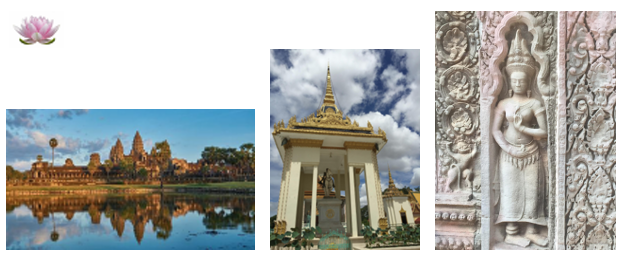
Medical, Surgical, and Dental Missions to Cambodia
Mission 12: PREAH VIHEAR PROVINCE 2024
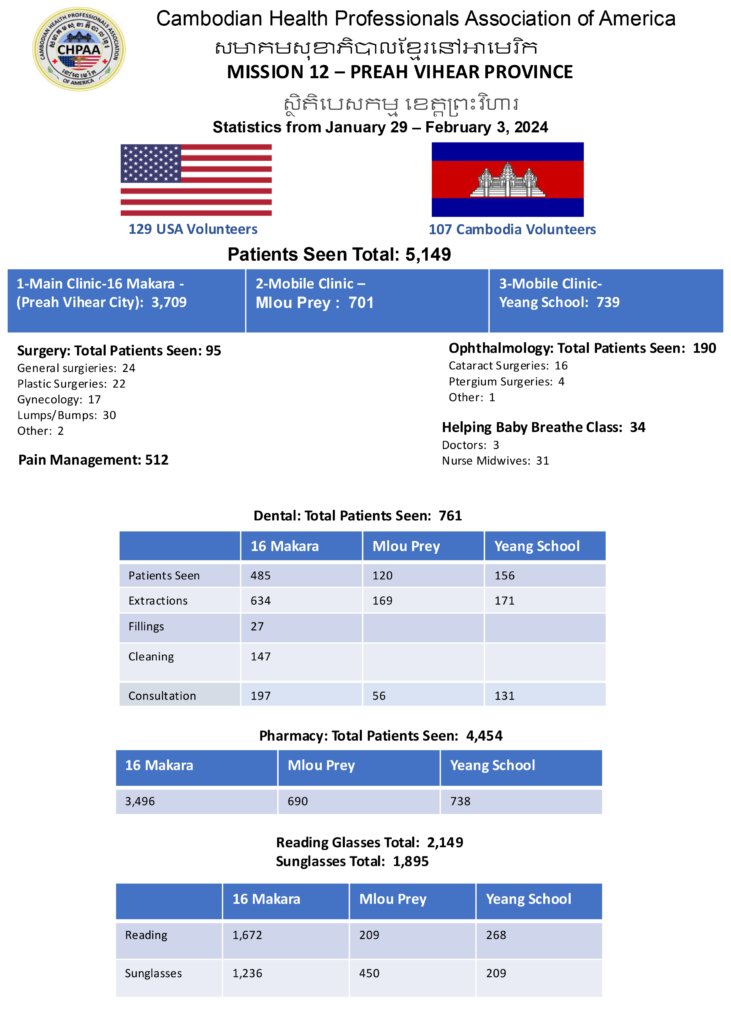
Mission 11: BANTEAY MEANCHEY PROVINCE 2023
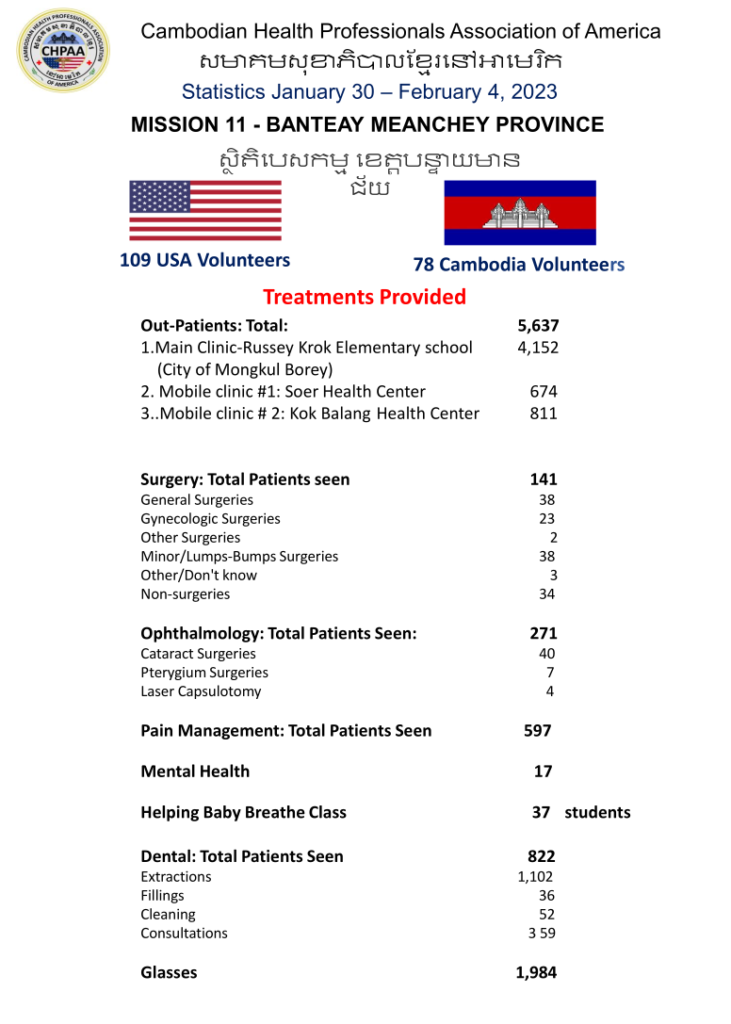
Mission 10: Kampong Speu Province 2020
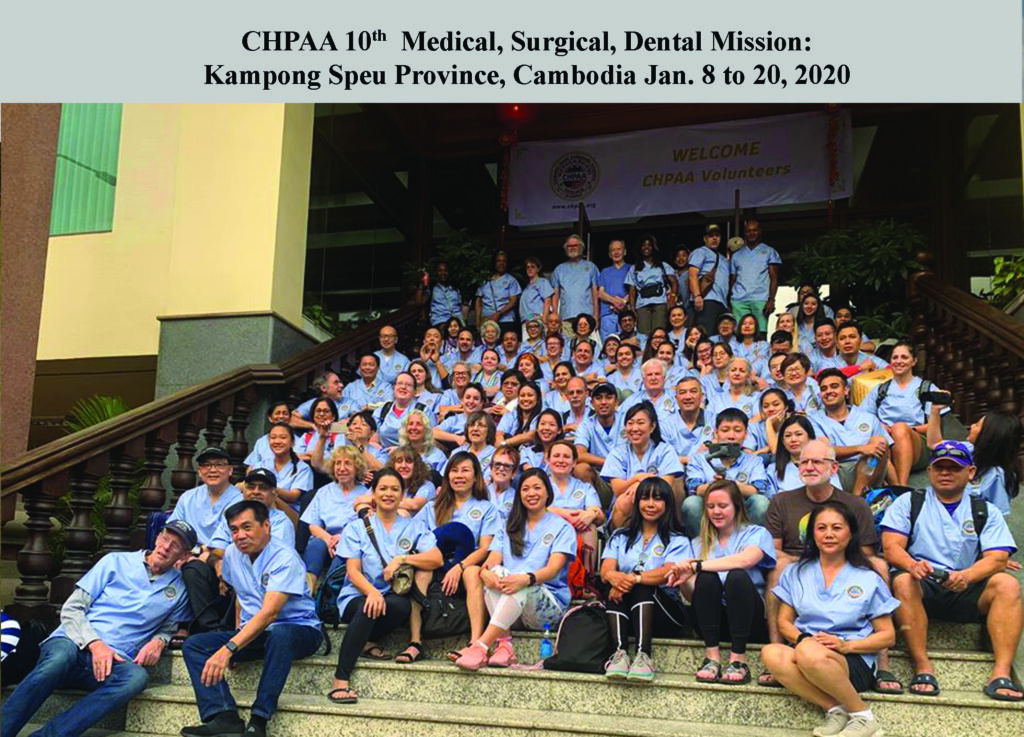
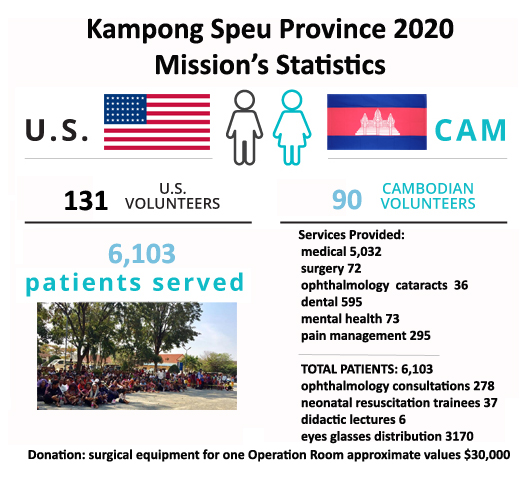
Photo Carousel
videos
Mission 9: Kampong Thom Province 2019
Statistics
- Medicine/Peds: 5682
- Surgeries: 98
- Acupuncture: 302
- Mental Health: 60
- Reading Glasses: 4495
- Helping babies breathe: 26 trainees
Dentistry
- Consults: 413
- Extractions: 881
- Filling: 16
- Root Canal: 2
